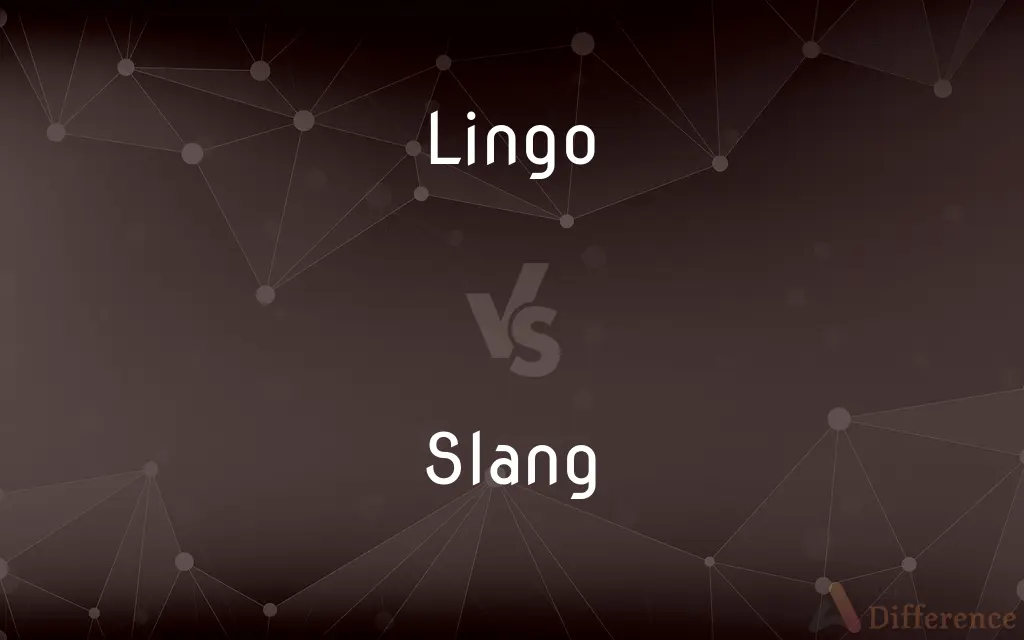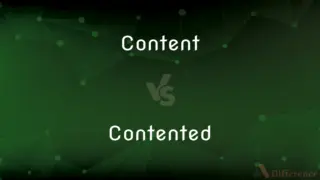Lingo vs. Slang — What's the Difference?
Edited by Tayyaba Rehman — By Maham Liaqat — Updated on April 6, 2024
Lingo refers to the specialized language used by a particular group, often hard to understand outside that context, whereas slang consists of informal words or phrases used within a language.

Difference Between Lingo and Slang
Table of Contents
ADVERTISEMENT
Key Differences
Lingo is characterized by its use in specific professions, hobbies, or groups, making it a kind of jargon. It includes terms and phrases that are understood primarily within a particular community. For instance, legal lingo is used by lawyers. On the other hand, slang is a more informal use of language, often developed within cultural or social groups. It includes words and phrases that are used in casual conversation, often to express identity or group solidarity.
While lingo serves to convey specific technical or specialized information efficiently among insiders, it can be exclusive and challenging for outsiders to understand. For example, medical lingo is essential for precise communication among healthcare professionals. Slang, however, evolves quickly and reflects contemporary culture and attitudes, making it dynamic and accessible but less stable over time.
Lingo often has a longer life span within its specific context and remains relatively stable as it serves a practical, professional, or hobbyist need. Technological lingo, with terms like "UI" (User Interface) or "API" (Application Programming Interface), illustrates this stability. Conversely, slang terms can change rapidly, with words coming in and out of fashion within a few years or even months, reflecting societal changes and trends.
The use of lingo can enhance communication efficiency and precision within a specific field or interest group, but it can also create barriers to understanding for those outside the group. Financial lingo, with terms like "bull market" or "liquidity," is essential for clear communication in finance but can be confusing for laypeople. Slang, by contrast, can make language more colorful and expressive, adding nuances of emotion or attitude, but its informal nature may not be suitable for professional or formal contexts.
Lingo and slang both enrich language by introducing new terms and expressions, but they serve different purposes and audiences. Lingo strengthens communication within specialized or professional groups, whereas slang makes language more vibrant and reflective of current cultural and social dynamics.
ADVERTISEMENT
Comparison Chart
Purpose
Facilitates specialized communication within a group.
Adds informality and cultural expression.
Context
Professional, hobbyist, and specific groups.
Casual, everyday conversations.
Stability
Relatively stable within its context.
Changes rapidly with cultural trends.
Accessibility
Can be exclusive, requiring specific knowledge.
Generally more accessible and widely understood.
Reflects
Technical or specialized information.
Contemporary culture and social attitudes.
Compare with Definitions
Lingo
Specialized language used within a particular profession or group.
The lingo of computer programming is filled with acronyms.
Slang
Expressive, informal words often characterized by novelty or brevity.
Binge-watch is slang for watching many episodes of a show in succession.
Lingo
Words or expressions used uniquely within a specialized area.
Culinary lingo involves terms such as julienne and mise en place.
Slang
Colloquial terms used by specific groups to establish identity.
Teen slang evolves rapidly, reflecting current trends and attitudes.
Lingo
Jargon or terminology unique to a specific activity or interest.
Sailing lingo includes terms like starboard and port.
Slang
Informal language consisting of words and expressions that are not considered standard.
Ghosting is slang for ending a relationship by stopping all communication.
Lingo
A distinctive style of speaking or writing characteristic of a particular group.
The lingo of online gamers can be perplexing to outsiders.
Slang
Language that conveys familiarity or a sense of belonging among its users.
Military slang includes acronyms and phrases unique to the service.
Lingo
The lexicon or vocabulary associated with a particular field of expertise.
Medical students spend years mastering medical lingo.
Slang
Nonstandard vocabulary that emerges from subcultures or social groups.
Skateboarding slang includes words like ollie and grind.
Lingo
The specialized vocabulary of a particular field or social group, especially when viewed as unfamiliar
Computer lingo.
The lingo of the local residents of the island.
"the lingo that rough union guys used among themselves" (Philip Roth).
Slang
Slang is language (words, phrases, and usages) of an informal register. It also sometimes refers to the language generally exclusive to the members of particular in-groups prefer over the common vocabulary of a standard language in order to establish group identity, exclude outsiders, or both.
Lingo
Language, especially language peculiar to a particular group, field, or region; jargon or a dialect.
Slang
A kind of language occurring chiefly in casual and playful speech, made up typically of coinages and figures of speech that are deliberately used in place of standard terms for added raciness, humor, irreverence, or other effect.
Lingo
Language; speech; dialect.
Slang
Language peculiar to a group; argot or jargon
Thieves' slang.
Lingo
A characteristic language of a particular group (as among thieves);
They don't speak our lingo
Slang
To use slang.
Slang
To use angry and abusive language
Persuaded the parties to quit slanging and come to the bargaining table.
Slang
To attack with abusive language; vituperate
"They slanged each other with every foul name they had learned from the age of three" (Virginia Henley).
Slang
Language outside of conventional usage and in the informal register.
Slang
Language that is unique to a particular profession or subject; jargon.
Slang
The specialized language of a social group, sometimes used to conceal one's meaning from outsiders; cant.
Slang
(countable) A particular variety of slang; the slang used by a particular group.
Slang
(countable) An item of slang; a slang word or expression.
Slang
(India) A curse word.
Slang
Any long, narrow piece of land; a promontory.
Slang
A fetter worn on the leg by a convict.
Slang
A counterfeit weight or measure.
Slang
A travelling show, or one of its performances.
Slang
A hawker's license.
Slang
A watchchain.
Slang
To vocally abuse, or shout at.
Slang
To sell especially illegal drugs.
Slang
Any long, narrow piece of land; a promontory.
Slang
A fetter worn on the leg by a convict.
Slang
Low, vulgar, unauthorized language; a popular but unauthorized word, phrase, or mode of expression; also, the jargon of some particular calling or class in society; low popular cant; as, the slang of the theater, of college, of sailors, etc.
Slang
To address with slang or ribaldry; to insult with vulgar language.
Every gentleman abused by a cabman or slanged by a bargee was bound there and then to take off his coat and challenge him to fisticuffs.
Slang
Informal language consisting of words and expressions that are not considered appropriate for formal occasions; often vituperative or vulgar;
Their speech was full of slang expressions
Slang
A characteristic language of a particular group (as among thieves);
They don't speak our lingo
Slang
Use slang or vulgar language
Slang
Fool or hoax;
The immigrant was duped because he trusted everyone
You can't fool me!
Slang
Abuse with coarse language
Common Curiosities
What is slang?
Slang comprises informal words or expressions not typically found in standard language, often used in casual communication.
Can a word be both slang and lingo?
Yes, some words can be considered both, depending on their use within specific communities or contexts.
Is lingo always difficult to understand for outsiders?
Often, yes, because lingo contains specialized terms that may not be widely known outside a specific group or field.
How does slang differ from colloquial language?
Slang is more informal and often tied to specific groups or cultural trends, whereas colloquial language is everyday speech that may not belong to any particular group.
How does slang reflect culture?
Slang reflects cultural trends, attitudes, and the social landscape, often capturing the zeitgeist of a particular time or group.
How do new lingo terms develop?
New lingo terms often develop from the need to describe new concepts, technologies, or practices within a specialized field.
Do slang terms eventually become part of standard language?
Some slang terms do become accepted into standard language over time as they gain widespread usage.
Can understanding lingo give insight into a particular group or profession?
Yes, understanding the lingo of a group or profession can provide insights into its values, practices, and areas of focus.
Is it important to keep up with slang?
It can be, especially to stay connected with cultural shifts or to understand communications in casual or specific social settings.
What is lingo?
Lingo refers to the specialized language used by a specific profession, hobby group, or community, characterized by technical or unique terms.
Why is lingo important in professional settings?
Lingo allows for precise and efficient communication within professional or specialized settings, facilitating clearer understanding among experts.
How can one learn the lingo of a specific field?
Engaging with the community, reading professional texts, and practical involvement are effective ways to learn the lingo of a specific field.
Where is slang commonly used?
Slang is commonly used in informal settings, social media, music, and among youth cultures.
Does lingo ever become outdated?
Yes, as professions and hobbies evolve, some lingo can become outdated and replaced by new terminology.
What role does slang play in language evolution?
Slang plays a significant role in the evolution of language by introducing new words and expressions that reflect changing societal attitudes and behaviors.
Share Your Discovery

Previous Comparison
Finger vs. Toe
Next Comparison
Content vs. ContentedAuthor Spotlight
Written by
Maham LiaqatEdited by
Tayyaba RehmanTayyaba Rehman is a distinguished writer, currently serving as a primary contributor to askdifference.com. As a researcher in semantics and etymology, Tayyaba's passion for the complexity of languages and their distinctions has found a perfect home on the platform. Tayyaba delves into the intricacies of language, distinguishing between commonly confused words and phrases, thereby providing clarity for readers worldwide.














































